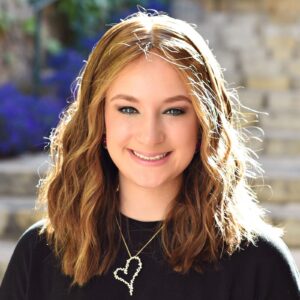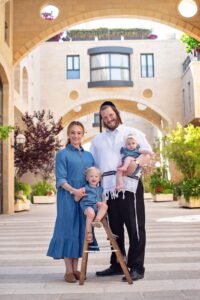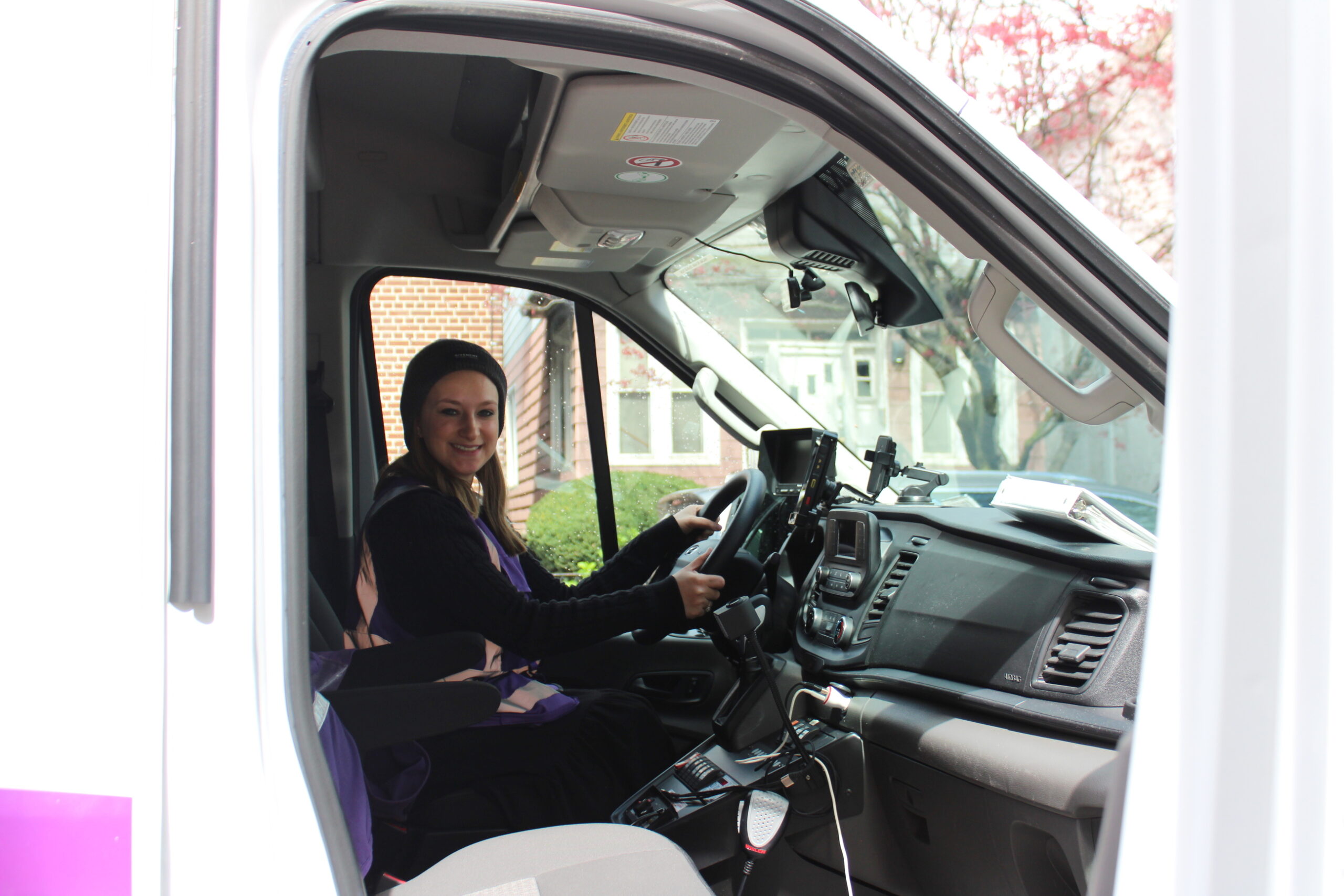It was a gloomy Friday in April and, for the first time, I entered the Borough Park neighborhood of Brooklyn. I was dressed in typical journalist fashion, wearing black trousers, a modest top and brown blazer — a contrast to the traditional garments worn in this tight-knit ultra-Orthodox Jewish community. I was there to meet Leah Freier Levine, a 25-year-old wife, mother and Chief Operating Officer of Ezras Nashim, the volunteer emergency medical service that caters to Orthodox Jewish women in New York City.

Borough Park is situated as the center of Jewish life in Brooklyn, with its own kosher stores, restaurants and cultural institutions. Many Orthodox women, like Levine, wear long dresses and skirts, and, when married, cover their hair. Levine wears a sheitel (a wig), which hits around her shoulders, as a way to adhere to tzniut, the character trait of modesty.
While I myself am not Jewish, I came across Levine and Ezras Nashim while researching modesty in healthcare. I was immediately stunned by Levine’s age and all she has done. I wondered how she managed it all and made it through each day. Is she tired? I knew I wanted to learn more, and as much as I could. With unprecedented access and trust, this reporting is a culmination of hours spent with Levine, trying to understand who she is beyond being the face of an organization.
A balancing act
Levine, compared to the average Hasidic woman, is in a unique position. While her first responsibility is to be a devoted wife and a mother, she told me sometimes it feels as if she’s living two entirely different lives. One, of course, is her life within her family, and the other is her role at Ezras Nashim. Sometimes it feels as if she’s being pulled in a million directions, often having to make decisions where what is necessary to move the organization forward might deviate from her traditions and lifestyle. I wondered, how does she honor her faith, and the traditions of her community, while also working to fulfill a higher purpose?
As I sit beside Levine in one of Ezras Nashim’s ambulances, her smartphone, which she uses in a limited capacity for work, rings. (While, in the Hasidic community, there is a general rule that frowns upon smartphone and Internet usage, Levine’s smartphone is heavily filtered and blocks social media and outside news. When Levine is with her family, she has a very simple flip phone, with a different number to talk and text.) She received an alert that there was an emergency call, to which she needed to respond in her capacity as an EMT. In seconds, she is tasked with yet another decision to make that day. You could see it on her face, and I heard it in her voice. We jumped out of the vehicle — there wasn’t time to waste, someone needed help. She ran back into the ambulance to assist with the call, telling me she’d be back soon.
For a greater good
Ezras Nashim opened its doors in 2014. The organization was founded by Levine’s mother, Judge Rachel Freier, the first woman from the ultra-Orthodox Hasidic community to serve as a judge in the United States. After stories were told to her by other Orthodox women who felt awkward and uncomfortable in emergency medical situations, Freier felt a women-led ambulance service would better serve religious women who wanted to uphold their modesty.
In her role as COO, Levine is responsible for handling daily operations, fundraising, recruitment, outreach, marketing and social media for Ezras Nashim. She graduated from Touro College in Brooklyn with honors, and is often the forward-facing representative for the organization in the media. She’s able to do this, as well as use a smartphone for work, with permission from her rabbi.
Levine, who is building on what her mother started, doesn’t do this work for ulterior motives, like fame or praise. She does it because she believes in the mission. Levine is one of Judge Rachel Freier’s six children. Freier told me while her path is much different than Levine’s, she feels “fortunate” that one of her children took an interest in Ezras Nashim.
At 25, Freier was working as a legal secretary, with a work day that ended at 5 p.m.. She explained that she couldn’t do what Levine does now because she didn’t know how. But Levine has watched this work in action almost her entire life.
Watching Levine in her role, while simultaneously juggling the duties that come with being a wife and mother, Judge Freier says she feels “so proud.”
In Orthodox Judaism, one of the guiding beliefs is the concept of the afterlife, most commonly referred to as “Olam Haba” in Hebrew, which means “the world to come.” The work they do in this life, Levine said, is for the next life. “We focus on the next world,” she explained to me.
After every event Levine hosts, she can see evidence of her time and effort — the work is fulfilling, but she is always busy. And she is OK with that. “My heart is very full,” she said. “I’m very thankful HaShem [a Hebrew term for God] chose me.”
When Levine said she was called to do this work, she is referring to just that idea. Her actions in this life will have consequences in the next. While still a young woman, Levine’s accomplishments and dedication are a reflection of her work ethic as an individual who is wise beyond her years.
“I feel like I’m a puppet that God used,” she said. “It doesn’t make sense, I don’t think it makes sense, but it’s just working, and I’m grateful I was chosen.”
When the work doesn’t stop
You’d think Levine’s day ends when she feeds her children supper and puts them to bed. But after her husband returns home from his day, they’ll have dinner, and then she’ll still continue to work. Levine explained to me that her husband is learning, which is the “highest spiritual thing that a man can do,” and she knows that comes with sacrifices she is willing to make.
“If your husband’s learning, that means he’s not working, that means you’re the breadwinner. That’s why it’s hard,” she explained. “Someone whose husband is also working, it’s not so hard because you have extra money coming in.”

Every day, Levine is learning something new on the job. She said she’s learned to not take certain things to heart, knowing that, if something doesn’t work out the way she intended, she just has to try again.
This success is seen and felt within her community, the members of Ezras Nashim, by the media and her family. While I could feel the pride Levine has for her work in every word she spoke, I could also see that she is tired — but that doesn’t mean she has intentions of slowing down. “That’s what I feel like is my unique success that HaShem made,” Levine said. “People feel very personally connected.”
She recounts one campaign back to me that had been pushed off. The organization was in a tight place, and Levine was feeling scared as she was personally impacted by the struggle.
“I reached out to some of my big donors, and I’m like, ‘I personally need your help’,” she recalled. “They helped me right away. So I think that personal part of it [informs] a lot of [our] success. Because I really care — I can’t sleep at night, [but] I will make sure that somebody helps.”
When Levine talks to esteemed publications and media outlets like The New York Times, she’ll share the story of Ezras Nashim. The world may soon begin to know her name, and while those closest to her may never see it, she will.
Like mother, like daughter
Dating back to when Levine was just a young girl, she was always trying to keep the peace. She wanted everyone in her school to feel included and heard. She was a reflection of her mother, who showed her charity in action her entire life.
“I remember there was a girl who was being bullied, and I called a class meeting [about it],” she said. “The kids listened to me because I took authority. My mother was a lawyer, and I was like the mini-lawyer in the class … Since [I was] little, I was always very careful about being nice to people, and I always cared about how people shouldn’t be hurt. I see now, with Ezras Nashim, I have to care so much.”
I’ve contacted Judge Freier, with the hope of speaking to her about her daughter, as well as the shared challenges they faced and how she’s balanced it all. The interview is forthcoming, and the story will be updated to reflect that conversation.
Levine said that, in all she does, she tries her very best. She knows sometime soon she’ll need to hire some help, and told me she hopes to find a “really good” executive assistant to help her with day-to-day tasks operations at Ezras Nashim.
When Levine looks at the growth of Ezras Nashim, she is proud, but she still questions if she’ll be able to fill her mother’s shoes. “It scares me when I think about it,” she said, reflecting that, in about 20 years, when she really would need to take over for her mother, it may be different.
“It’s in God’s hands. You just have to try,” Levine said. “It’s God’s organization, it’s not a business. This is an organization, this is God’s work, this is for his people.”








